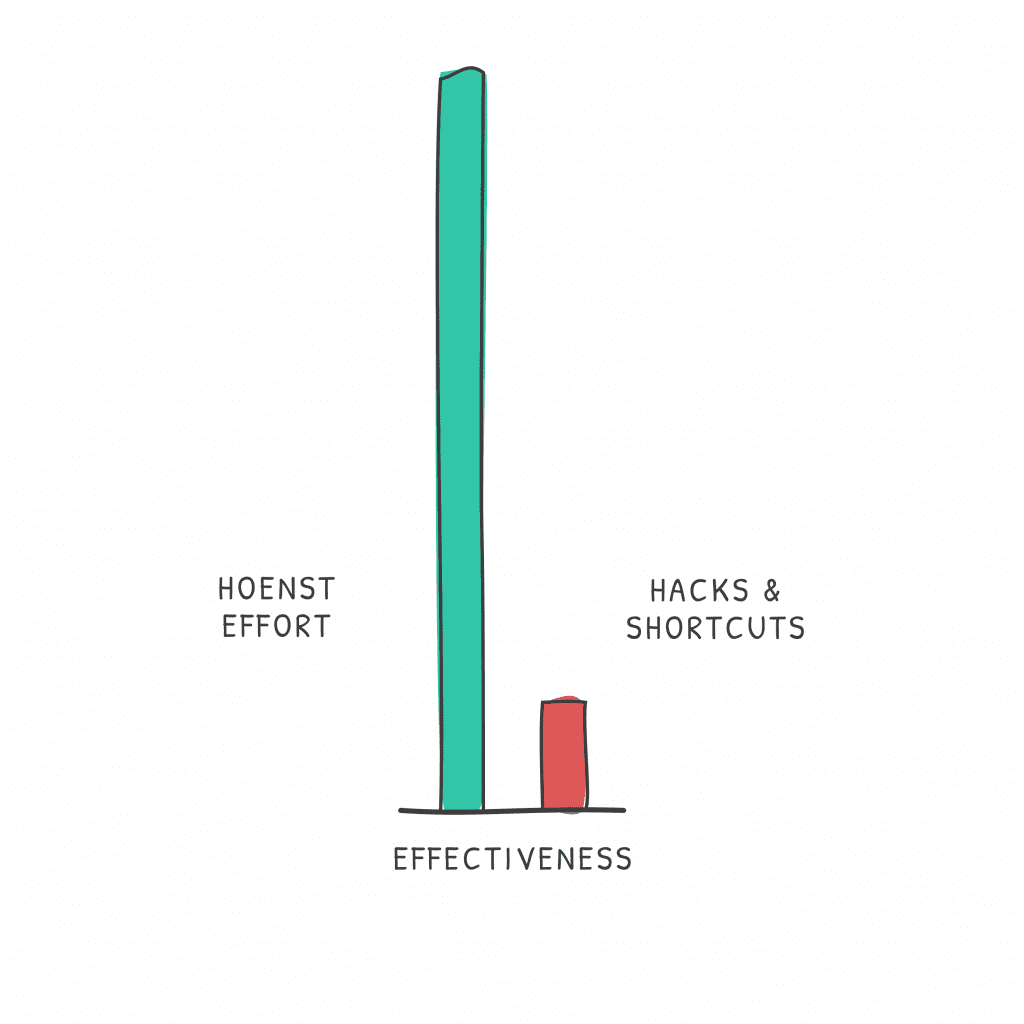Fake it till you make it
Table of Contents
If you’ve been doing anything related to the startup world the last few years, then you’ve heard the term “fake it till you make it.” In my eyes, I see it as overpromising and then trying to deliver as much of that promise as possible without guaranteeing success. It seems innocent enough. The only problem is that it can turn into fraud too quickly.
The ugly fakers
Don’t get me wrong — I embrace the manual work at the start of your startup life. Instead of automation, you do things by hand for the first months to validate your idea. I’m okay with this concept, as you’re providing value to your clients and not just promises.
Companies on the other end of the spectrum — Theranos, Fyre Festival, Enron, and probably many more — have gone so far down the faking hole that they couldn’t see the light.

A quick summary about them:
- Theranos — defrauded investors and gathered almost a billion dollars without an actual product. They tricked the investors into believing they had a product by doing theatrics during presentations. Elizabeth Holmes and her COO were convicted in 2022.
- Fyre Festival — Billy Farlaine defrauded investors and his customers. He fiddled with his company’s numbers to raise investment to make the Fyre Festival possible. Promised the customers luxury stays and provided them with plain FEMA/UN tents. Huge difference.
- Enron — Jeffrey Skilling and his CFO lied to investors and created elaborate accounting tricks to boost their on-paper value and hide their toxic assets. This is more of an example of pure fraud rather than a “fake-it-till-you-make-it” attitude, but I thought to include it also.
- Anna Sorokin - just a con artist in general who based her whole life on faking it.
All of these stories are fascinating, and I highly recommend diving deep into each of them.
They were lying to their investors and customers. After reading and listening to podcasts about these cases, there’s always one thing in common — when this fraud is happening, the key people don’t understand that they’re defrauding their investors. They see themselves as the heroes who are trying to move the company forward by all means — it’s all good to fake it if, in the end, we make it, right? Right?
There’s a fine line between outright fraud and making your company succeed. So why take the risk? Why not cultivate a culture where success is not what you’re striving for, but authenticity is.
The problem with faking it is that it’s very hard to distinguish companies that have real value and those that are all hot air. So many Silicon Valley Ventures are shouting AI this, NFT that. If most companies are faking it, then even the companies with real value seem fake, especially when they have VC money and stand like giants next to the actual makers.
The good fakers
The concept of faking it till you make it doesn’t serve your business, but it can be a push in the right direction during your college years. For example, if you’re in the habit of thinking that you’re not suited to studying engineering, your brain will probably default to this type of thinking which will worsen your chances of succeeding. You become the things that you make into habits.
If you get into the mindset of being a marathon runner and implement all the small habitual changes that marathon runners do, you’ll eventually become a marathon runner. So this is where “fake it till you make it” works nicely. If you think and act like you’re “a confident engineer who wants to better the world,” — people will believe you, but much more importantly — you will start believing it.

You're not faking anything. You're practicing being the person you want to be. So practice being a decent person.
The better approach
As long as you’re practicing being a good version of yourself, the world around you becomes a better place, and the company thrives together. But you still need to stay true to yourself — if you don’t like Star Wars, don’t start telling everyone that you enjoy that movie just to fit in. That’s how it starts — with the small lies to fit in.
Every employee brings a unique perspective to the table. I want our employees to feel comfortable being introverted or shy or not as confident as the next person. These unique life experiences result in a “beautiful mess” effect — which roughly translates to when different people come together it results in something extraordinary.
In a culture that values perfection, it can be difficult to feel like we can ever truly be ourselves. When we share our authentic selves—including our vulnerabilities—we open the door to empathy and connection. And these are the foundations of solid and successful businesses. By creating a culture of acceptance, we can enable everyone just to be themselves. This doesn’t mean that we should ignore our faults or weaknesses. But it does mean that we should strive to understand and accept ourselves—and others—with all of our imperfections. Only then can we truly thrive at work.

Conclusion
Fake it till you make it is a spectrum. On the one side, you put on a brave face in a stressful situation or pretend to be confident during a company-wide presentation when you need to speak up.
On the other side, we have fraud. Pretending to have a working product when you rely on third-party technology to make it happen. Impersonating a Youtube Executive to get a deal with Goldman Sachs. Or selling a luxury Villa for 250K per weekend and then shrugging it off as “false advertising”.
I see no reason to compromise your values for hockey-stick growth. Do you?
-
Ryan Fields
Real talk, honesty’s big in the startup game. “Fake it till you make it” sounds cool but it’s a risky play. Seen too many crash and burn cuz they overpromised and couldn’t deliver. Smart startups? They keep it 100 with what they can do and focus on making their product legit instead of just hyping it up. Gotta remember, trust is everything. You think keeping it real from the start matters more than big talk?
-
Piper
I believe that being authentic and honest in business is crucial for long-term success. Faking it till you make it may work in some situations, but ultimately, integrity and authenticity will set you apart from the rest. It’s important to stay true to yourself and your values, even when faced with challenges or temptations to take shortcuts. Building a culture of acceptance and embracing your unique perspective can lead to a thriving and successful business. So, let’s focus on being genuine and true to ourselves, rather than faking our way to success.
-
Ollie
Honestly, the whole “fake it till you make it” vibe feels like a tech bro mantra that’s played out. If I’m launching a startup, my goal is to keep it real – talk about what our product can actually do right now, not some pie-in-the-sky dream. You overpromise, you’re just setting up for a massive letdown, and in the startup world, trust is like cryptocurrency – super volatile and critical to your value. Better to underpromise and overdeliver
